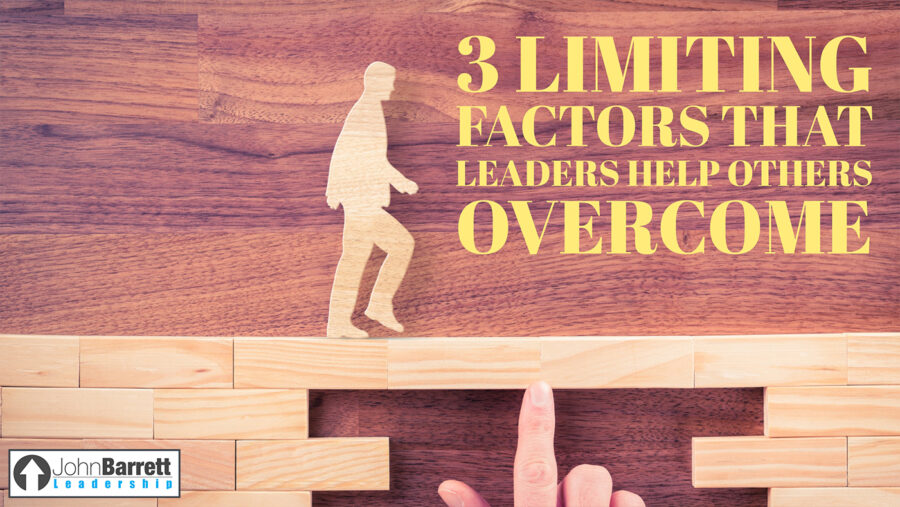3 Limiting Factors That Leaders Help Others Overcome…
Leaders help others. They lead people through the limiting factors that hold them down. Here are 2 limiting factors that leaders help others overcome…
Bad Experiences
When an individual has a bad experience in any area of life, they tend to stay away from ever having an experience like it again; unfortunately, in the process of staying away, people tend to shut down any possibility of a different outcome for the future. They shelter themselves from any and all experiences for fear they will turn into bad experiences. The result is a self-made prison built on negativity and skepticism that affects both their personal and professional life. Mark Twain said, “We should be careful to get out of an experience only the wisdom that is in it, and stop there, lest we be like the cat that sits down on a hot stove-lid. She will never sit down on a hot stove-lid again, and that is well, but also she will never sit down on a cold one either.”
Zig Ziglar tells of a famous study done about the effects of bad experiences. Scientists took a group of fleas and put them in a jar with a lid. The insects tried hard to jump out, but were met with disappointment as they smashed their little heads against the top. After a period, scientists removed the lid, providing an escape for the fleas. They were home free! But the fleas didn’t take advantage of this new found freedom. Had they become content in their little mason jar home? Not quite. The fleas did not escape because they had conditioned themselves to jump below the height of the lid. They believed the lid was still on the jar. They were living on experience rather than exploring the possibility of escape. We, too, can condition ourselves to jump only as high as the lids that we and others place on our lives. When we stop moving forward for fear of having a bad experience, we waste the possibility of having a great experience.
When we stop moving forward for fear of having a bad experience, we waste the possibility of having a great experience.
Unmet Expectations
Another reason people lose hope is from unmet expectations. When an individual sets their sights on a particular expectation and experiences disappointment, the door to frustration and hopelessness opens up. Expectations are a great thing, but they can alter a person’s emotional state if not handled correctly. Many people have a hard time when their expectations don’t meet reality. This can cause a significant breakdown in someone’s ability to keep advancing. The danger comes when frustration and bitterness start to dominate their thoughts and well-being. Instead of being able to deal with the outcome through continual persistence, people are disappointed to the point of despair; so, they give up in their efforts.
Numerous studies by Professor Wolfram Shultz of Cambridge University have shown us the physical effects of unmet expectations. By not achieving a particular target, there is a decrease in a person’s dopamine level, resulting in an altered limbic mode, which controls an individual’s emotional behavior. This changed state, caused by low levels of dopamine, leads to increased anxiety and stress. Low levels of dopamine also cause the prefrontal cortex, responsible for focus and decision making, to decrease in functionality, leading to less creativity and stifle problem-solving abilities. The resulting emotional state reduces confidence, leading to further unmet expectations and the downward spiral continues on. Hope begins to fade away when an individual is emotionally consumed with unmet expectations. Understand that unfulfilled expectations will always exist on the journey of success. We have to continually encourage people to be driven by determination rather than being dominated by discouragement. Instead of lowering expectations we need to raise perseverance.
We have to continually encourage people to be driven by determination rather than being dominated by discouragement.
Continual Resistance
The third reason people lose hope is a result of constant resistance in their efforts. It becomes very discouraging for an individual when they face opposition time after time and situation after situation. This resistance drains them of the energy needed to move forward. Over time, they will begin to slow down under the continual pressure of resistance until they eventually stop producing results. The vast majority of people view resistance as abnormal, and believe it means they are on the wrong path however, resistance occurs even when we are on the right track. Author Steven Pressfield, wrote, “Fear is good. Like self-doubt, fear is an indicator. Fear tells us what we have to do. Remember our rule of thumb: the most scared we are of a work or calling, the surer we can be that we have to do it. Resistance is experienced as fear; the degree of fear equates to the strength of the resistance. Therefore, the more fear we feel about a specific enterprise, the more certain we can be that that enterprise is important to us and the growth of our soul. That’s why we feel so much Resistance. If it meant nothing to us, there’d be no resistance.”
When people view resistance through a negative lens, it causes them to only see obstacles. Rather than pushing through the opposition, they become hopeless on their journey. When people lose hope, they lose the drive that is necessary to break through barriers. When we only focus on the problems around us we can easily miss the power within us. Without the hope to move on, they become a wanderer lost in the land of apathy. Take to heart what Henry Ford said, “When everything seems to be going against you, remember that the airplane takes off against the wind, not with it.”
When we only focus on the problems around us we can easily miss the power within us.










